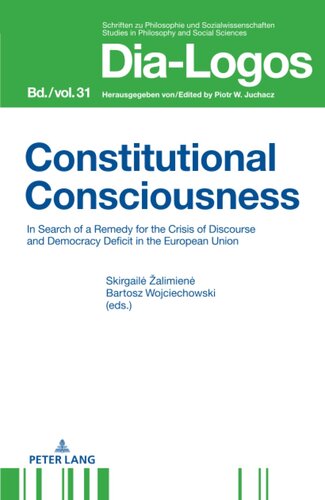

Most ebook files are in PDF format, so you can easily read them using various software such as Foxit Reader or directly on the Google Chrome browser.
Some ebook files are released by publishers in other formats such as .awz, .mobi, .epub, .fb2, etc. You may need to install specific software to read these formats on mobile/PC, such as Calibre.
Please read the tutorial at this link. https://ebooknice.com/page/post?id=faq
We offer FREE conversion to the popular formats you request; however, this may take some time. Therefore, right after payment, please email us, and we will try to provide the service as quickly as possible.
For some exceptional file formats or broken links (if any), please refrain from opening any disputes. Instead, email us first, and we will try to assist within a maximum of 6 hours.
EbookNice Team

Status:
Available0.0
0 reviews
ISBN-10 : 3631895569
ISBN-13 : 9783631895566
Author: Skirgailė Žalimienė
Constitutional consciousness belongs not solely to the legal field, but also to other social sciences. It refers not only to constitutional and national identity but also to European identity, as the general principles of EU law derive from common constitutional traditions. Its low level results with difficulties in the proper reading of the legitimacy of power and with the recently widely discussed democratic deficit both in member states and in the EU itself. The publication addresses the issue of European integration and the common catalogue of values and human rights. The aim is to point out that increasing its level in society shall bring remedy for the democratic deficit in the EU and strengthen respect for fundamental rights. This thesis gives the publication an innovative Character.
Part I The Role of Democratic Thinking in the Shaping of Legal Awareness and Legal Recognition1
1. Introduction
2. Deliberative democracy as a requirement for responsive legal policy
3. Legal recognition as a component of civil society
4. The idea of constitutional patriotism as an expression of citizen solidarity
Bibliography
National Identity: Constitutional Patriotism or Dialogue on Values1
1. Introduction
2. Explaining the concept of the national identity clause
2.1. Historical developments establish a legal framework for national identity
2.2. The content of the concept of the national identity clause
2.3. The place of the national identity clause in the EU legal system
2.4. National identity and the principle of EU law primacy
2.5. National and/or constitutional identity
3. Challenges to the judicial application of the national identity clause
3.1. Adjudication on national identity as a duality of competences
3.2. Cooperation, balance of competence and proportionality test
3.3. Preliminary reference procedure
4. Examples of application of the national identity clause
4.1. Actions of annulment
4.2. Actions for failure to fulfil obligations
4.3. References for preliminary rulings
5. National profile: Lithuania
6. Conclusions
Bibliography
The Margin of Appreciation – a Safety Anchor for Constitutional Identity in Semiotic and Legal Co
1. Introduction
2. Identity issue
3. The margin of appreciation as a limiting tool
4. A (Polish) case study – an illustration
5. Conclusions
Bibliography
The Political Versus Proportionality – Methods of Justifying Conflicts of Constitutional Values1
1. Introduction
2. Proportionality
3. The political
4. Conclusion
Bibliography
The Indifference of Law to Literature1
1. Law and literature: The formation of identity
2. The literary image of legal consciousness
3. Imagination as part of the relationship between law and literature
4. Literature and relationship to the identity of law
5. Context of interpretation
6. Conclusion
Bibliography
Part II The Limits to Constitutional Amendments and the Question of Constitutional Identity and Citizens’
1. General remarks
2. Constitutional consciousness
3. Limits to Polish Constitution amendments
4. Constitutional identity and substantive limits to constitutional amendments
5. Constitutional power and the scope of constitutional amendments
6. Final remarks
Bibliography
“Tempering Steel” – on Shaping the Standard of Interpretation of the Convention as Exemplifie
1. “How steel was tempered”9 – on shaping the standard of interpretation of Article 8 of the
2. “A Hunter’s Sketches”29 – or the technique of building an interpretation standard
3. “Marriage”32 – or the finalité of the development of the standard of interpretation of Ar
4. “Tomorrow morning”42 – or how can events go on? (instead of conclusions)
Bibliography
Freedom of the Rule of Law-Promoting Expression of Prosecutors under European Law1
1. Introduction
2. The European Court of Human Rigths case Kövesi v. Romania
3. The rule of law under the Convention and EU law
3.1. Convention
3.2. EU law
4. Protection of the freedom of expression under the Convention
4.1. Specifics of different categories of information
4.2. Specifics of expression serving rule of law-promoting aims
4.3. No office v. private distinction
4.4. Specifics of judges
4.5. Specifics of prosecutors
5. The link between judicial independence and the freedom of expression under the Convention
6. Prosecutors as judicial authority under EU law
7. Conclusion
Bibliography
Right of Access to Justice in Environmental Matters as One of the Forms of Public Participation in G
1. Introduction
2. The Identification of European Union values
2.1. The notion of a value of the European Union
2.2. Environmental protection – an European Union value
3. The concepts of the public and the public concerned
4. Public participation in environmental decision-making
4.1. The scope of the rights of the public in the area of environmental protection
4.2. The right of access to justice as security for the effectiveness of public participation in env
4.3. Public participation in addressing environmental issues – an important guarantee of public p
5. Conclusions
what is consciousness
what is consciousness in the bible
constitutional concept
constitutional concept meaning
consciousness consciousness
Tags: Constitutional Consciousness, In Search, the Crisis of Discourse, Democracy Deficit, European Union, Skirgailė Žalimienė